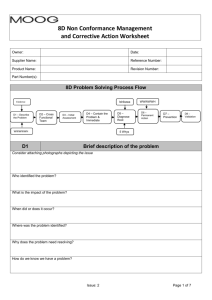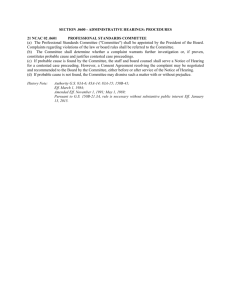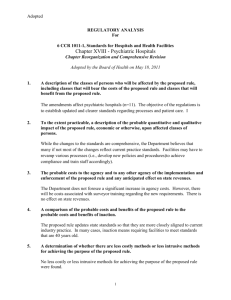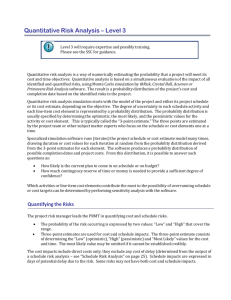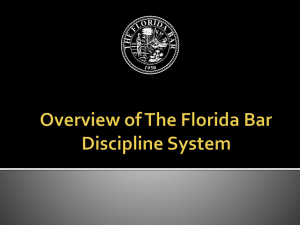False Arrest & Malicious Prosecution
advertisement
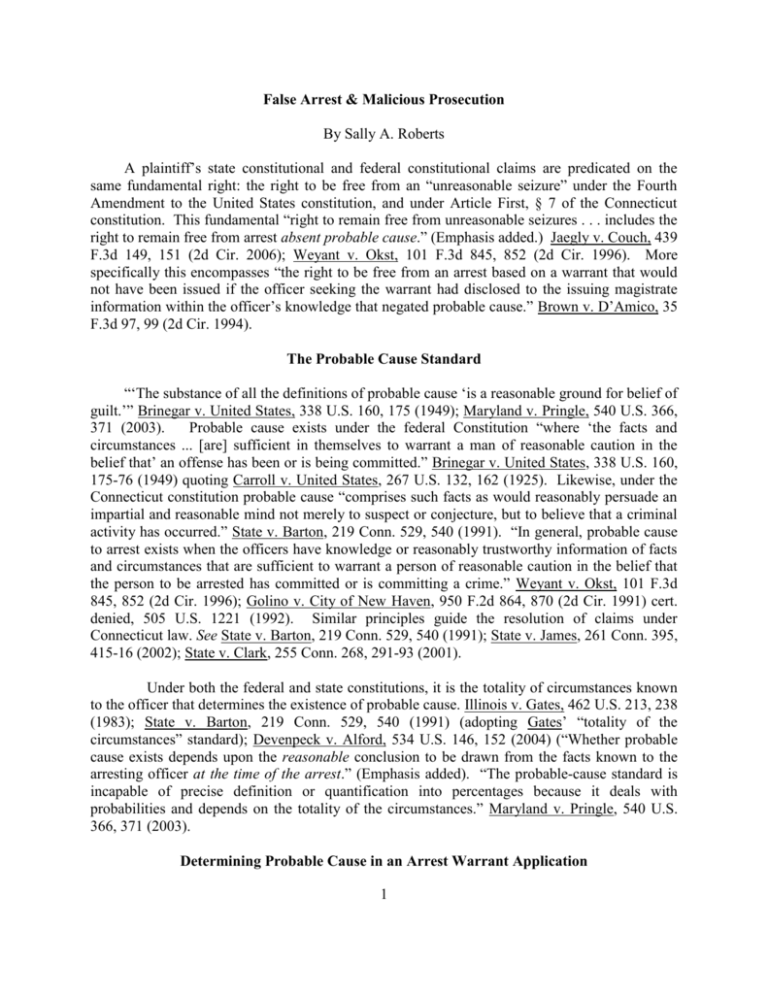
False Arrest & Malicious Prosecution By Sally A. Roberts A plaintiff’s state constitutional and federal constitutional claims are predicated on the same fundamental right: the right to be free from an “unreasonable seizure” under the Fourth Amendment to the United States constitution, and under Article First, § 7 of the Connecticut constitution. This fundamental “right to remain free from unreasonable seizures . . . includes the right to remain free from arrest absent probable cause.” (Emphasis added.) Jaegly v. Couch, 439 F.3d 149, 151 (2d Cir. 2006); Weyant v. Okst, 101 F.3d 845, 852 (2d Cir. 1996). More specifically this encompasses “the right to be free from an arrest based on a warrant that would not have been issued if the officer seeking the warrant had disclosed to the issuing magistrate information within the officer’s knowledge that negated probable cause.” Brown v. D’Amico, 35 F.3d 97, 99 (2d Cir. 1994). The Probable Cause Standard “‘The substance of all the definitions of probable cause ‘is a reasonable ground for belief of guilt.’” Brinegar v. United States, 338 U.S. 160, 175 (1949); Maryland v. Pringle, 540 U.S. 366, 371 (2003). Probable cause exists under the federal Constitution “where ‘the facts and circumstances ... [are] sufficient in themselves to warrant a man of reasonable caution in the belief that’ an offense has been or is being committed.” Brinegar v. United States, 338 U.S. 160, 175-76 (1949) quoting Carroll v. United States, 267 U.S. 132, 162 (1925). Likewise, under the Connecticut constitution probable cause “comprises such facts as would reasonably persuade an impartial and reasonable mind not merely to suspect or conjecture, but to believe that a criminal activity has occurred.” State v. Barton, 219 Conn. 529, 540 (1991). “In general, probable cause to arrest exists when the officers have knowledge or reasonably trustworthy information of facts and circumstances that are sufficient to warrant a person of reasonable caution in the belief that the person to be arrested has committed or is committing a crime.” Weyant v. Okst, 101 F.3d 845, 852 (2d Cir. 1996); Golino v. City of New Haven, 950 F.2d 864, 870 (2d Cir. 1991) cert. denied, 505 U.S. 1221 (1992). Similar principles guide the resolution of claims under Connecticut law. See State v. Barton, 219 Conn. 529, 540 (1991); State v. James, 261 Conn. 395, 415-16 (2002); State v. Clark, 255 Conn. 268, 291-93 (2001). Under both the federal and state constitutions, it is the totality of circumstances known to the officer that determines the existence of probable cause. Illinois v. Gates, 462 U.S. 213, 238 (1983); State v. Barton, 219 Conn. 529, 540 (1991) (adopting Gates’ “totality of the circumstances” standard); Devenpeck v. Alford, 534 U.S. 146, 152 (2004) (“Whether probable cause exists depends upon the reasonable conclusion to be drawn from the facts known to the arresting officer at the time of the arrest.” (Emphasis added). “The probable-cause standard is incapable of precise definition or quantification into percentages because it deals with probabilities and depends on the totality of the circumstances.” Maryland v. Pringle, 540 U.S. 366, 371 (2003). Determining Probable Cause in an Arrest Warrant Application 1 It is crucial that the magistrate reviewing an affidavit for the existence of probable cause have sufficient factual information surrounding the underlying circumstances in order to make an informed decision as to the existence of probable cause. Whiteley v. Warden, Wyoming State Penitentiary, 401 U.S. 560, 564-65 (1971). “Though an officer need not volunteer every fact that arguably cuts against the existence of probable cause, the officer may not omit circumstances that are critical to the evaluation of probable cause.” Brown, 35 F.3d at 99. A plaintiff can establish a violation of his right not be arrested except upon a finding of probable cause, “where the officer submitting the probable cause affidavit ‘knowingly and intentionally, or with reckless disregard for the truth, made a false statement in his affidavit’ or omitted material information, and that such false or omitted information was ‘necessary to the finding of probable cause.” Soares v. State of Connecticut, 8 F.3d 917, 920 (2d Cir. 1993) (citing Franks v. Delaware, 438 U.S. 154, 155-56 (1978)).1 Recklessness on the part of the officer may be inferred “where the omitted information was critical to the probable cause determination.” Golino v. City of New Haven, 950 F.2d 864, 871 (2d Cir. 1991). And of course, in drafting an affidavit, “an officer may not disregard plainly exculpatory evidence.” Panetta v. Crowley, 460 F.3d 388, 395 (2d Cir. 2006). It is well settled that the question of probable cause, as it relates to an arrest warrant application, is a mixed question of law and fact. Whether an item of information is material or not is, in the context of a motion for summary judgment, a mixed question of law and fact . . . The legal component depends on whether the information is relevant to a given question in light of the controlling substantive law . . . The factual component requires an inference as to whether the information would likely be given weight by a person considering that question. (Citations omitted.) Golino v. City of new Haven, 950 F.2d 864, 871 (2d Cir. 1991), cert. denied, 505 U.S. 1221 (1992); Smith v. Edwards, 175 F.3d 99, 105 (2d Cir. 1999); Velardi v. Walsh, 40 F.3d 569, 574 (2d Cir. 1994). In other words, the question of whether the misrepresented or omitted information is relevant to the existence of probable cause, is determined by the court; while the question of the “weight that a neutral magistrate would likely have given the” misrepresented or omitted information, “is not a legal question but rather is a question to be resolved by the finder of fact.” Golino v. City of New Haven, 950 F.2d at 871-72; Velardi v. Walsh, 40 F.3d 569, 574 (2d Cir. 1994). “[T]he weight that a neutral magistrate would likely have given such [omitted] information is a question for the finder of fact, so that summary judgment is inappropriate in doubtful cases.” Ham v. Green, 248 Conn. 508, 522 (1999) citing Golino, 950 F.2d at 871-72; TSC Industries, Inc. v. Norway, Inc., 426 U.S. 438, 450 (1976). 1 It was in Franks v. Delaware that the Supreme Court recognized the right of criminal defendants to bring a Fourth Amendment challenge to the validity of a warrant whose affidavit contained allegedly false statements or omitted material information. Id., 155-56. The Franks test is the same test used for analyzing such claims in a § 1983 false arrest claim. See Cartier v. Lussier, supra, 845; Ham v. Green, 248 Conn. 508, 522 (1999) cert. denied, 528 U.S. 929 (1999). 2 The “legal component” of the inquiry involves a two-step process. “The first step in assessing the materiality of such an omission is to ‘correct’ the allegedly defective affidavit by inserting the information withheld from the magistrate judge.” Smith v. Edwards, supra, 105. See Cartier v. Lussier, 955 F.2d 841, 845 (2d Cir. 1992). “The second step is for the court to then determine ‘whether as a matter of law [the corrected affidavit] did or did not support probable cause.’” Smith v. Edwards, 175 F.3d 99, 105 (2d Cir. 1999); See Soares v. State of Connecticut, 8 F.3d 917, 920 (2d Cir. 1993); Magnotti v. Kuntz, 918 F.2d 364, 368 (2d Cir. 1990). “If probable cause remains, no constitutional violation of the plaintiff’s Fourth Amendment rights has occurred.” Soares, 8 F.3d at 920; Smith v. Edwards, supra, 105. “In such a case, any disputed factual issues cannot be deemed ‘material,’ and summary judgment is warranted.” Id. at 105. On the other hand, if the corrected affidavit does not, as a matter of law, support probable cause, then false statements or omissions were material, and summary judgment should be denied. 3
